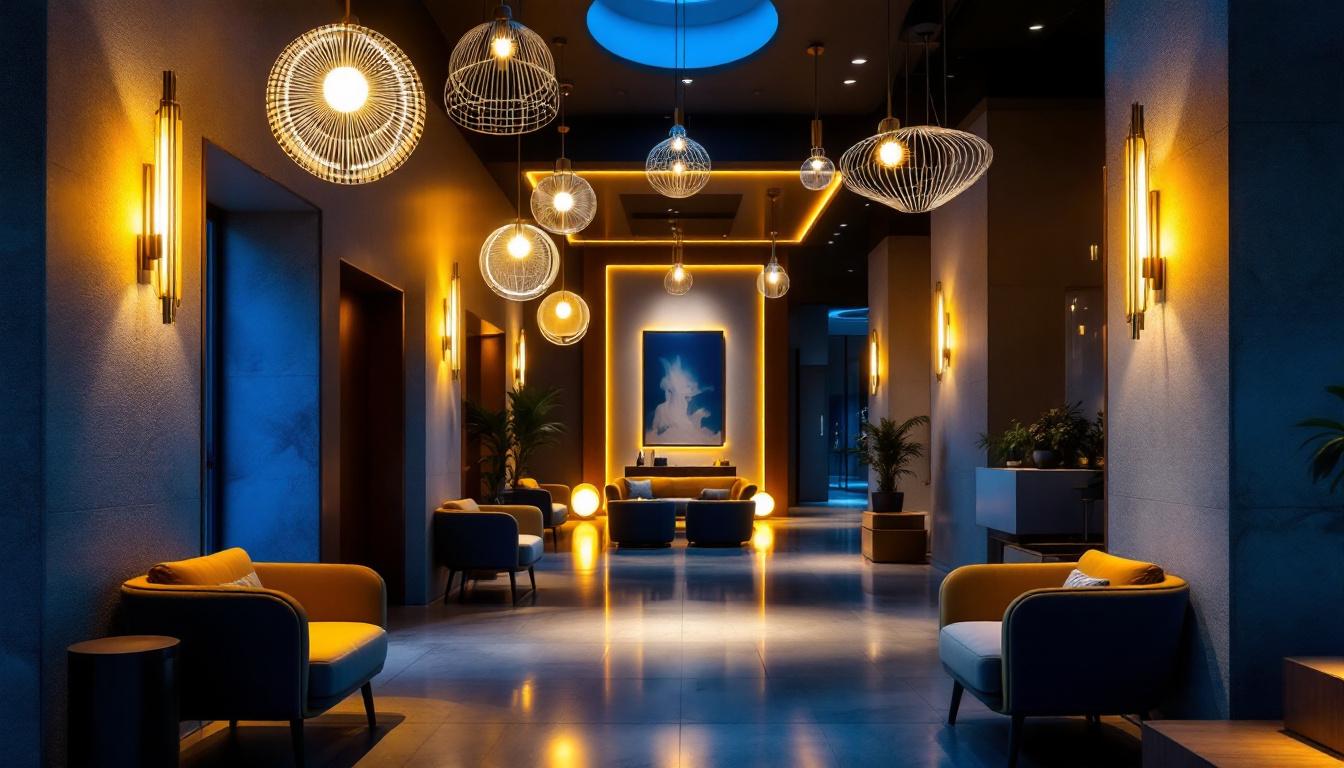
In the hospitality industry, lighting plays an integral role in shaping the guest experience. From creating a welcoming ambiance to enhancing the functionality of spaces, modern lighting solutions are vital for hotels aiming to provide exceptional service. This article delves into the significance of hotel lighting, exploring the latest trends, technologies, and design considerations that lighting contractors should be aware of.
Lighting in hotels is not merely a functional necessity; it serves as a crucial element in establishing a hotel’s identity and atmosphere. The right lighting can elevate a space, making it more inviting and comfortable for guests. In contrast, poor lighting can detract from the overall experience, leaving guests feeling unwelcomed or uncomfortable.
Ambiance is a critical factor in the hospitality industry. Lighting sets the mood in various areas of the hotel, from the lobby to the guest rooms. Soft, warm lighting can create a cozy atmosphere in lounges and restaurants, while brighter, cooler lights may be more appropriate for workspaces or fitness areas. Understanding how to manipulate light intensity and color temperature is essential for lighting contractors to meet the specific needs of different hotel environments. Additionally, the use of dimmers and smart lighting systems allows for further customization, enabling hotel staff to adjust the atmosphere according to the time of day or specific events, such as romantic dinners or lively gatherings. This flexibility not only enhances the guest experience but also contributes to energy efficiency, as lights can be dimmed or turned off in unoccupied areas.
In addition to ambiance, functionality is a key consideration in hotel lighting design. Proper illumination can enhance safety and accessibility, guiding guests through hallways and staircases. Task lighting in work areas, such as desks in guest rooms, ensures that guests can perform activities comfortably and efficiently. By integrating both aesthetic and functional lighting solutions, contractors can significantly improve the overall guest experience. Moreover, the strategic placement of lighting can highlight architectural features or artwork within the hotel, drawing attention to elements that enhance the overall design narrative. For instance, uplighting can accentuate tall ceilings or intricate moldings, while focused spotlights can illuminate a stunning piece of art, creating a visually engaging environment that captivates guests.
Lighting also plays a pivotal role in establishing a hotel’s brand identity. Unique lighting designs can differentiate a hotel from its competitors, creating memorable experiences that guests associate with the brand. For instance, a boutique hotel may use artistic light fixtures to reflect its creative ethos, while a luxury hotel might opt for elegant chandeliers to convey sophistication. Lighting contractors must work closely with hotel owners and designers to develop lighting schemes that align with the hotel’s vision and branding. Furthermore, the integration of local culture and history into lighting design can create a sense of place, allowing guests to feel more connected to their surroundings. This could involve using locally sourced materials for light fixtures or incorporating traditional lighting styles that resonate with the region’s heritage, thus enriching the guest’s overall experience and fostering a deeper appreciation for the destination.
The evolution of lighting technologies has transformed the way hotels approach their lighting solutions. With advancements in LED technology, smart lighting systems, and energy-efficient designs, lighting contractors have a plethora of options to choose from when designing hotel lighting.
LED lighting has become a staple in modern hotel design due to its energy efficiency and longevity. Unlike traditional incandescent bulbs, LEDs consume significantly less energy and have a much longer lifespan, reducing maintenance costs for hotel operators. Additionally, LEDs are available in a wide range of colors and intensities, allowing for greater flexibility in design. This adaptability makes it easier for contractors to create customized lighting solutions that meet the specific needs of each hotel space.
Smart lighting systems are revolutionizing the way hotels manage their lighting. These systems allow for remote control and automation of lighting, enabling hotels to adjust settings based on occupancy or time of day. For instance, lighting can be dimmed in common areas during off-peak hours to save energy, while guest rooms can be programmed to welcome guests with soft lighting upon entry. Such innovations not only enhance guest comfort but also contribute to sustainability efforts, making them an attractive option for modern hotels.
As sustainability becomes increasingly important in the hospitality industry, energy-efficient lighting solutions are gaining traction. Hotels are under pressure to reduce their carbon footprint, and lighting is a significant area where improvements can be made. By opting for energy-efficient fixtures and incorporating natural light through design, hotels can minimize energy consumption while enhancing the guest experience. Lighting contractors play a crucial role in advising hotel owners on the best practices for sustainable lighting solutions.
When designing lighting solutions for hotels, several key considerations must be taken into account. These include the type of space, the intended use, and the overall aesthetic of the hotel. A well-thought-out lighting design can significantly impact the functionality and ambiance of each area.
A layered lighting approach is essential for creating a balanced and versatile lighting scheme. This method involves combining ambient, task, and accent lighting to achieve the desired effect in each space. Ambient lighting provides overall illumination, task lighting focuses on specific areas, and accent lighting highlights architectural features or artwork. By employing this strategy, contractors can ensure that each area of the hotel is well-lit and serves its intended purpose effectively.
Hotels often host a variety of events and activities, necessitating flexible lighting solutions. Lighting contractors should consider designs that allow for easy adjustments, such as dimmable fixtures or movable light sources. This adaptability enables hotels to create different atmospheres for various occasions, from intimate dinners to large conferences, ensuring that lighting meets the changing needs of the space.
Lighting should seamlessly integrate with the hotel’s interior design. The choice of fixtures, colors, and styles must complement the overall aesthetic of the space. For example, a modern hotel may feature sleek, minimalist fixtures, while a traditional hotel might opt for ornate chandeliers. Collaborating with interior designers can help lighting contractors select the right fixtures and placements to enhance the hotel’s visual appeal.
While there are numerous opportunities in hotel lighting design, several challenges can arise. Understanding these challenges allows lighting contractors to develop effective strategies to overcome them.
One of the primary challenges in hotel lighting design is balancing aesthetics with functionality. While it is essential to create visually appealing spaces, lighting must also serve its practical purpose. Contractors must carefully consider how to achieve this balance, ensuring that lighting enhances the guest experience without compromising safety or usability.
Hotels are subject to various regulations regarding lighting, including energy codes and safety standards. Lighting contractors must stay informed about these regulations to ensure compliance in their designs. Failure to adhere to these standards can result in costly penalties and safety hazards, making it crucial for contractors to prioritize regulatory compliance in their projects.
Budget constraints are a common challenge in hotel lighting projects. While it is essential to invest in quality lighting solutions, contractors must also be mindful of costs. This requires a careful selection of fixtures and technologies that provide value without exceeding the budget. By working closely with hotel owners to establish clear budget parameters, contractors can create effective lighting solutions that meet both aesthetic and financial goals.
The future of hotel lighting is poised for exciting developments as technology continues to advance. Emerging trends and innovations are likely to shape the way hotels approach their lighting solutions.
Human-centric lighting is an emerging trend that focuses on the impact of lighting on human health and well-being. This approach considers factors such as circadian rhythms and the psychological effects of light. Hotels may begin to adopt lighting designs that mimic natural daylight, promoting guest comfort and enhancing overall well-being. Lighting contractors will need to stay informed about these trends to offer solutions that cater to the evolving needs of guests.
The integration of the Internet of Things (IoT) and artificial intelligence (AI) in lighting systems is set to revolutionize hotel lighting. Smart devices can collect data on guest preferences and occupancy patterns, allowing for personalized lighting experiences. For instance, AI can adjust lighting based on guest behavior, creating a more tailored and enjoyable environment. Contractors must be prepared to implement these advanced technologies to stay competitive in the evolving market.
As sustainability continues to be a priority for consumers, hotels will increasingly seek lighting solutions that are environmentally friendly. This emphasis on sustainability will drive the demand for energy-efficient fixtures, renewable energy sources, and smart lighting systems that reduce energy consumption. Lighting contractors will play a pivotal role in guiding hotels toward sustainable practices that align with their values and goals.
In the modern hospitality landscape, lighting is a vital component that influences guest experiences, enhances functionality, and reinforces brand identity. As lighting technologies continue to evolve, contractors must stay informed about the latest trends and innovations to provide effective solutions for hotels. By understanding the importance of lighting, embracing modern technologies, and considering design challenges, lighting contractors can significantly contribute to the success of hotels in creating memorable and inviting spaces.
Ready to elevate your hotel lighting designs to new heights? At LumenWholesale, we provide lighting contractors with the finest spec-grade lighting products at prices that can’t be beaten. Say goodbye to local distributor markups and hello to a vast selection of industry-standard lighting solutions that promise reliability and high performance. With free shipping on bulk orders, LumenWholesale is your go-to source for premium lighting without the premium price tag. Enhance your next project with the ideal fusion of quality, value, and convenience. Discover Wholesale Lighting at the Best Value today and light up your hotel spaces with confidence.

Discover the essential guide for lighting contractors in “Light On A Pole: The Ultimate Handbook.” This comprehensive resource covers everything from installation techniques to the latest industry trends, ensuring your projects shine brightly and efficiently.

Discover innovative strategies and cutting-edge technologies that lighting contractors can leverage to enhance efficiency and performance.

Discover essential insights and practical tips for lighting contractors on utilizing UFO LED lights.

Discover essential tips and common pitfalls for lighting contractors with Euri.